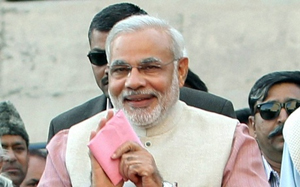
New Delhi, Jun 7: Gujarat Chief Narendra Modi's role in the next Lok Sabha election is expected to be the dominant theme of the BJP National Executive in Goa this weekend, amid a strong demand from some sections of the party for declaring him the campaign committee head.
Ahead of the two-day conclave, Central office-bearers of the party will meet to discuss the agenda for the National Executive meet.
Sources said some of the office-bearers are likely to press for declaring Modi as the campaign committee head during the conclave.
But, a consensus on the issue is eluding the party top brass. As a result, the proposal may not see the light of day at the National Executive meet.
"There is expectation among the cadre that BJP President Rajnath Singh will give out a clear message to the party at the Goa conclave. He has been working on it and is in consultation with BJP top brass and members of Parliamentary Board prior to the conclave," BJP spokesperson Rajiv Pratap Rudy said when asked about the issue.
Asked if decks have been cleared for Modi to be announced as the campaign committee chief, Rudy said nothing has been firmed up yet. He refused to comment further on it.
However, sources said Singh is still in consultation with the top leadership on the issue.
There are apprehensions that some die-hard Modi supporters who are part of the BJP National Executive may publicly demand during the conclave that the Gujarat Chief Minister be made the head of the campaign committee.
Senior BJP leader Yashwant Sinha has virtually ruled out the possibility of Modi's name being announced at the meet.
Asked if leadership issue is the focus of Goa conclave, Sinha told a news channel, "The National Executive of the BJP is too large as a body to discuss leadership issues...BJP has already made it very clear that these issues will be decided in the Parliamentary Board."
While Modi will hog the limelight whether an announcement about his role in the Lok Sabha elections is made or not, the party will discuss other aspects of the preparations for the next general elections.
The National Executive will pass two resolutions. There will be a resolution on the internal and external security situation in the country and the UPA government's failure to deal effectively with the challenges.
Though BJP usually passes a political and an economic resolution at its national executive meets, a change has been made in the forthcoming conclave. Sources said this has been done due to the recent Naxal attack in Chhattisgarh on Congress leaders. The BJP government in the state has drawn flak for the incident.
The political resolution to be adopted at the Goa meet will incorporate the economic issues, party sources said. Issues like price rise, state of the economy, corruption and scams will figure in this resolution.
Discussions on other matters like strengthening the party at the booth level and issues to be taken to the people are also on the agenda.
Relations with NDA allies like JD(U) and the need for winning over more parties to the coalition will also figure.
Several top leaders of the party are, however, likely to skip the national executive. Vice President Uma Bharti, General Secretary Varun Gandhi, Deputy Leader of BJP in Rajya Sabha Ravi Shankar Prasad, Jaswant Singh and Satrughan Sinha are not likely to attend, party sources said.
While Bharati is unwell after a long tour for her Save Ganga project, Gandhi is away in Paris with his wife to spend some time after the sad demise of his new born child. Prasad is leading a delegation to Sri Lanka.





Comments
Add new comment